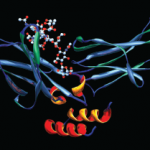WASHINGTON, D.C.–Despite all the worry that tumor necrosis factor (TNF) inhibitors might heighten the cancer risk in arthritis patients, the evidence is fairly scant that there is a big risk, the co-editor of the ACR’s Drug Safety Quarterly said in a session titled, “Update on Safety Issues in the Treatment of Rheumatic Diseases,” here at the 2012 ACR/ARHP Annual Meeting, held November 9–14. [Editor’s Note: This session was recorded and is available via ACR SessionSelect.]
Overall, “there is no drug-related risk of new cancer, and there appears to be no added risk of cancer recurrence in several short-term studies,” said John Cush, MD, who is also director of clinical rheumatology at the Baylor Research Institute in Dallas, during a session on safety issues related to rheumatology therapies.
The topic drew great interest in 2003, when a U.S. Food and Drug Administration (FDA) evaluation of three TNF inhibitors—etanercept, infliximab, and adalimumab—and the treatment of 6,303 patients found that six people taking TNF blockers developed lymphoma, while none on placebo did. In a postmarketing review, another 165 lymphomas were discovered from the nearly 515,000 patients taking TNF inhibitors since their release.
The FDA—which eventually required a black-box warning about cancer risk— found that the standardized incidence ratio was 3.47 for etanercept, 6.4 for infliximab, and 4.35 for adalimumab.
But those numbers are “overlapping what’s seen in RA [rheumatoid arthritis] risk,” Dr. Cush said. “Patients with uncontrolled inflammation have a two- to tenfold risk of lymphoma and maybe as high as a 71-fold risk in those with the most active disease.”
Meta-analyses—involving 20,000 to 70,000 patients—have yielded similar findings, he said.
The story is similar in the recurrence of cancer in RA patients who’ve had cancer previously—there’s not much data indicating a heightened risk for recurrence.
Examining Other Types of Cancer, Specific Populations
The risk, though, doesn’t appear to be the same with all kinds of cancer, Dr. Cush said.
A 2010 study looking at 293 patients with prior malignancies found that there was a higher incidence of melanoma recurrence among patients taking TNF blocker than patients taking disease-modifying anti-rheumatic drugs (DMARDs)—3 out of 17 patients with prior melanoma had a recurrence, compared to 0 out of 10 in the DMARD group.1
“While overall cancers were less on the TNF inhibitor, they were more if you had an issue with melanoma,” Dr. Cush said. “Maybe you should be exercising caution in patients with a prior history of melanoma.”
Cancer incidence among children with juvenile idiopathic arthritis (JIA) has also been raised as a concern by the FDA. But there is also debate over this point—and increased cancer risk might be caused by the disease rather than the drug, Dr. Cush suggested.

